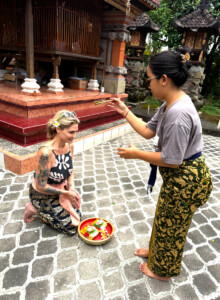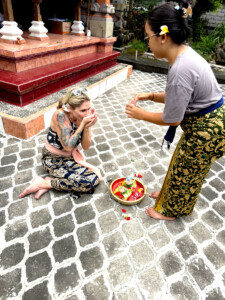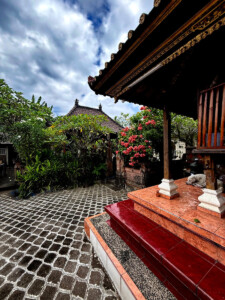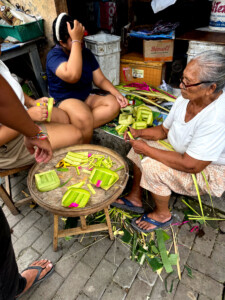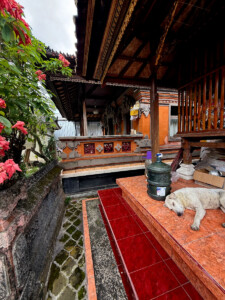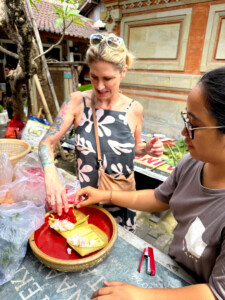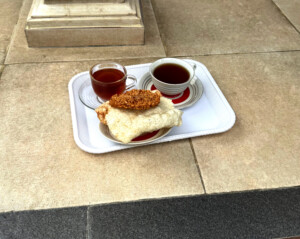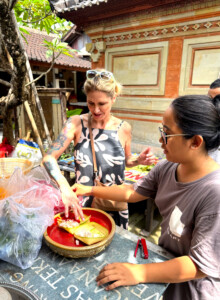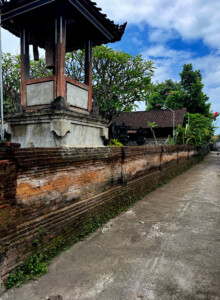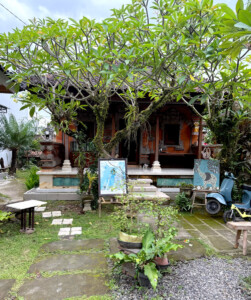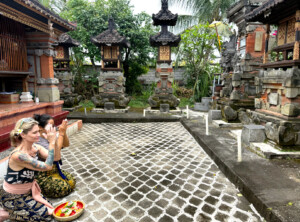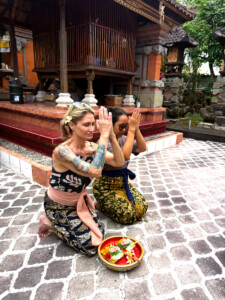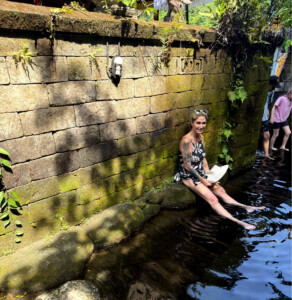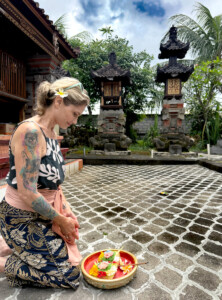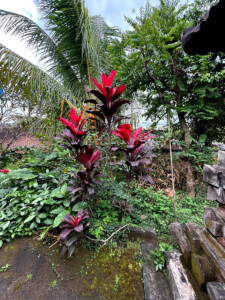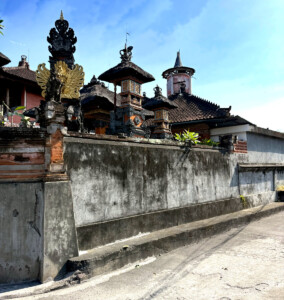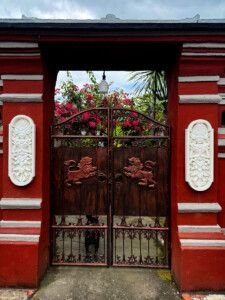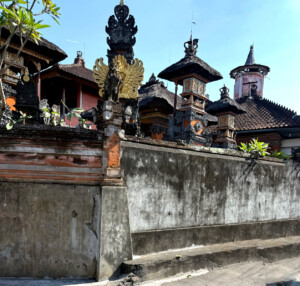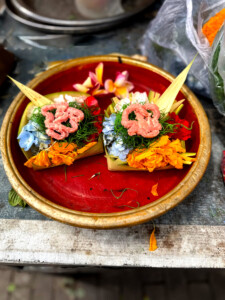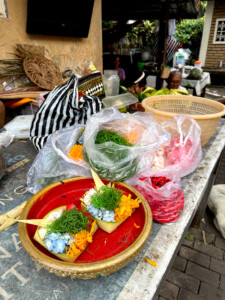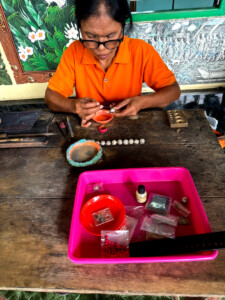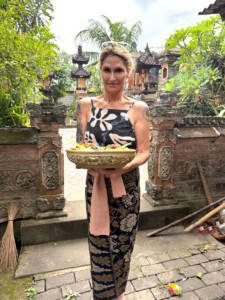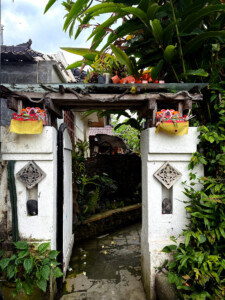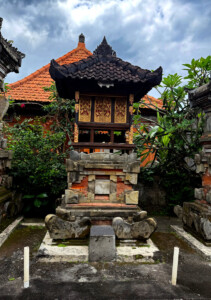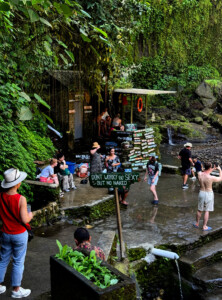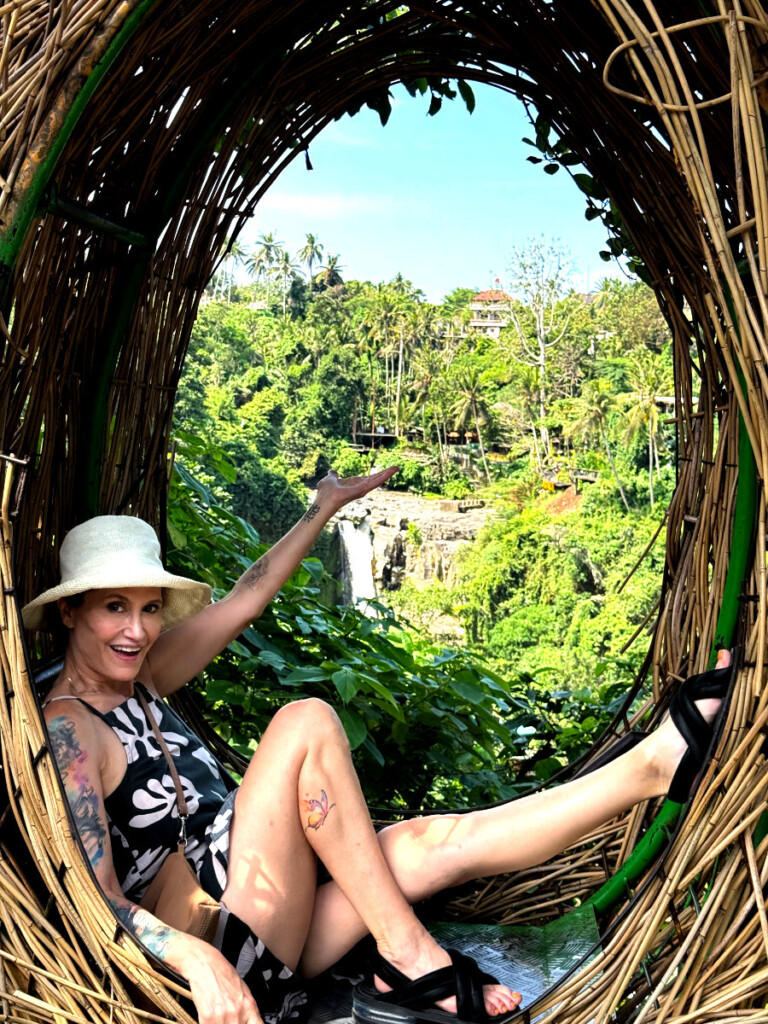I took my first steps at nine months old. My very first solo adventure was around the age of two. I’d crawled out of my crib, made my way next door into our neighbor Dolly’s house, where my parents found me “playing” the piano with Miss Dolly’s dachshund, Duchy, howling alongside me.
Real Bali: authentic Ubud travel experience by Lary Kennedy
From fake tours to real Bali: Lary Kennedy’s authentic travel story in Ubud
Real Bali travel story by Lary Kennedy
My sense of adventure was likely triggered by my grandmother’s travels around the world. Growing up, she’d bring me dolls from every country she visited. This doll collection was fostered by my mother—no doubt in attempts to tame the tomboy in me. But not being able to actually play with these dolls, forced to display them dressed in their traditional garb, felt fake.
Kind of like Disneyland’s It’s a Small World ride. Kind of like Disneyland in general. I didn’t want to just see the Pirates of the Caribbean ride. I wanted to be on that boat, swigging rum, getting scurvy, and teaching the parrot to say “fuck you.” That’s an adventure.
My seventh-grade teacher, Mr. Goodwin, once set up a display with photos from Italy, France, Germany, and England, with the chance to “win a trip” to whichever country’s corresponding package of assignments was successfully completed with an A. I remember excitedly spilling out the details to my father when he came home from work. He appeared nonplussed. Didn’t matter—time to put my thinking cap on. I was headed to France. Ooh la la.
Turns out the “trips” were merely slideshows of each country. The winner got to tour his or her country while the rest of us took a pop quiz. Whoop da whoop.
When I graduated from high school, my father took me to Europe. Half out of guilt for not telling me there was no way my little country school had the funds to fly me to France, and the other half out of pity that I was stupid enough to fall for it. Europe was awesome. Being with a tour group, however, still felt fake. Like we were on a ride, going from one predestined tourist spot to the next. Traveling en masse: the Europeans staring at us as we walked by while we stared back.
The majority of the forty or so in our group were paired up. Once we dispelled the rumor that I was my dad’s young “chicky,” the only two single ladies battled it out for his attention. Kinda creepy.
Traveling, no matter how it’s done, is by far the greatest teacher I’ve ever had. Meeting people from all around the world, having friends from different cultures with vastly different upbringings—that fascinates me. My curiosity about everything turns my wheels, keeps me moving. I want to be in the thick of life. Experience life. Absorb life. Understand life. Feel life. Live life. Peering in on other existences during a two-week vacation will never cut it for me. Ever again.
Part of me is frightened by this. I’ve passed the point of no return.
At 10 a.m. sharp, Putu arrives ready to show me the real Ubud. “Are you all better?”
“Good enough,” I said.
“OK, then you can meet the family.”
We had discussed going to his house to see his dog. Meeting the family was news to me. From what I’d experienced up to now, Asians were far from family portraits with Fido. Putu didn’t even have a picture of his dog on his phone. Maybe he was referring to his girlfriend or wife. Or maybe it was just his mediocre English skills.
First stop: “We go to my village, which is known for local artists,” he said.
I was licking my chops. “Alrighty! This is the kind of stuff I’m talking about—going to remote villages, seeing how real people make money.”
Pulling into the long driveway of the handmade silver “factory,” before I could even open my door I was greeted by a woman who, just like the coffee guy, went into auto-spiel mode, reciting a script she’d said a thousand times. She pointed out an ancient woman sitting outside, painstakingly setting minuscule silver beads on a silver ball the size of a pea, “proving” that all we were about to see was made right here by this old Balinese woman. They must have a stable of these old broads to pick from.
She then led me inside, where rows of display cases were filled with thousands of pieces of silver jewelry, figurines, utensils—you name it. I politely browsed. The second my eye landed on something—click—the case was instantly open and she pulled out the ring. Then a bracelet. OMG. I changed course and went to the opposite side and—whoosh—again, she was right there, poised to throw open the case and bring out something silver. I zigzagged a few times before she got the hint.
Exiting down the stairs, fighting back annoyance, I took my seat in the back. “So Putu, you promised you’d show me how to make the offerings.” He had, when I first met him. Once he agreed, I wouldn’t stop bringing it up. Hopefully, he was annoyed. He may not be from Java, but I was starting to feel screwed. Welp, there went my real-life tour experience. I mean, I got it. This was how he made his living. I didn’t have to hire him.
“Everything OK back there?” Putu asked.
“Ya, just feeling a little tired.”
Ten minutes later, we pulled onto a side street, parked, got out, and walked toward a beautiful temple-like exterior.
“What place is this?” I asked.
“This is my home. Only we can’t go in here.”
Oh brother. This guy really shamboozled me.
“This is your house but we can’t go in?”
“Yes, this is my uncle’s compound. You can look in.”
From what I could see, it was gorgeous. “My uncle has a lot of money—they have four family temples,” Putu explained.
Compounds, temples—what’s the diff? I thought. Everything looked the same: massive, with courtyards, walkways, exquisite flowers and trees. I could make out a few different buildings, lots of statues, all of it extremely ornate.
This was just like in Hollywood where tour buses pull up to a huge gated house surrounded by ten-foot shrubbery somewhere in Beverly Hills, claiming George Clooney lives there.
“OK, now to my house.”
We walked up a bit and entered through a white entryway. I was expecting to see stairs leading up to an apartment unit. Instead, it opened into a courtyard. I saw his dog lying on a raised platform, which Putu explained was the family dining area of sorts. Then a bubbly voice:
“Oh hi!” A woman appeared from behind.
“This is my sister,” Putu said.
“Oh no,” she said, “the place is a mess, forgive me.”
I looked around the courtyard: small buildings, statues, flowers. “I’ll bring you some tea, please sit,” she said. Clearly, she wasn’t expecting me. If I wasn’t expecting anybody, I’d hide.
Putu pointed to one building. “That’s my sister’s room. There are the toilets. My parents. Etc.”
Now I got what he meant about “compound.” All these buildings were separate rooms—even the kitchen.
“Wow. This should have been so cool growing up. I would have loved to live this way.”
His sister came back with tea and rice-looking crackers. “You’re in luck, my mom just made a fresh batch.”
I sat and took one. Freaking delish. “Please,” I said to Putu, “have some.” I only asked to be polite. I wanted to eat them all myself.
“Oh no,” his sister laughed, “we eat these every day for breakfast.”
“So you all live here?” I asked.
“Yes. Me, my brother, mother, father, grandmother. We all live here. Our great-grandfather built this house and we’ve lived here ever since.”
I couldn’t get a clear reading on how old Putu was, but he was well out of his twenties. His sister was married and had a young son, yet here she hanging out in her ‘room’. They must really like commingling. But it kind of made sense. Everyone had their own space, which meant they didn’t have much “together time” to get on each other’s nerves.
We shit-shatted a bit, then Putu’s dad arrived. He greeted me warmly and spoke better English than Putu.
“This place is so cool,” I said to him.
“Believe me, this is a modest home in Bali,” he replied.
“I would so love to live in a house like this. Thank you so much for letting me see your home.”
I felt like this was a good time to exit, but Putu asked, “Do you want to make the offerings?”
“Yes, Yes, I do,” I said, excitedly.
We walked back behind the dining pavilion where five women sat preparing the offerings—his mother, aunt, and cousins surrounded by banana leaves and flowers.
“We make these offerings every single day, as we give thanks at least three times a day,” his sister explained.
I was offered a seat while she showed me how to assemble one. She explained the meaning of each flower color and how they were to be set in the banana basket. Putu’s father came back to watch, clearly getting a kick out of my glee.
“This is so cool,” I kept saying.
I assembled one and once again shared my gratitude for being welcomed into their home and being taught this ritual. Then I looked at Putu, ready to move on.
“Would you want to say a prayer in the family temple?” his sister suddenly blurted out.
“YA! I would so love to. What an honor,” I said. There was no way in hell any of this was preplanned. This was real. Happening right in the moment.
“You need to wear a sarong, it’s tradition,” his father added.
His sister brought one, and I slipped it on over my dress. They all looked at me.
“Oh, you look so pretty,” they said.
They appeared as delighted as I felt.
His sister walked me to the entrance of the family temple, which took up half the compound. Before entering, we removed our shoes. Then I was told to kneel, placing my offering with the white flowers always facing the gods.
“Our first prayer is to the gods, giving thanks for all he has given,” his sister said. “The second prayer is to the ancestors, and the third prayer is for family and friends.”
Then she sprinkled me with holy water. At some point, we put a flower behind our ears, but I couldn’t remember when or why. Since this was real life, I wasn’t given a flyer with all the pertinent information to take away.
I thanked them again for their graciousness.
“When you come back to Ubud, you must come see us,” Putu’s father said.
“I promise I will, sir.”
Back in the car, I told Putu, “That was by far the best thing I will ever do in Ubud.”
He told me that while it was rare, he had taken a client or two home before—but no one had ever made an offering and prayed at their family temple.
We stopped for a brief lunch at a local warung. Yet another tourist trap, but I figured I’d give him one. Besides, they were known for their bebek—roast duck in banana leaves—which I wanted to try. I liked it.
Then we were off to Tegenungan Waterfall. Again, another tourist draw, but this one was worth seeing. Nothing fake about it at all. Just a bunch of tourists. But in reality, that’s all Ubud is—one big tourist trap. That’s not to say it isn’t beautiful and worth seeing.
I tried to limit my exposure to the teeming masses bargaining for chachkis in the city center, the indescribable traffic conditions, and every massage, restaurant, and shop employee grabbing at you to come inside.
“Now we have to see the house that holds all the locals’ paintings,” Putu said.
Sure enough, I was instantly greeted by another woman eager to tell me the story of every single painting. At this point, I couldn’t even pretend to put on a fake face. I walked listlessly from one section to another.
“Oh, there’s more over here,” she said.
Putu finally caught up with me after parking a ways away.
“I’m traveling with a suitcase. No room,” I told her.
“Oh, we have these handy roll-up containers that fit—”
I didn’t even let her finish her sentence. I moved in the opposite direction, but she still managed to pull a container out of her … side cabinet.
Walking back to the car, Putu said, “OK, now we go to the wood carvers.”
“No, Putu,” I said. “Now we go home. I’m not buying anything, OK? Nothing.”
“OK, sure. But if you need a ride to Sanur in the morning, I can take you.”
“Putu, it’s an hour drive from here, and besides, you don’t take cards. I’m completely out of cash, and my credit card is linked through Grab.”
I genuinely liked Putu and couldn’t fault him for making a living, but our time had ended. I wasn’t faking it—the only way to pay for anything until I got to a Western Union was with good old-fashioned plastic money.
Real Bali travel blog by Lary Kennedy
